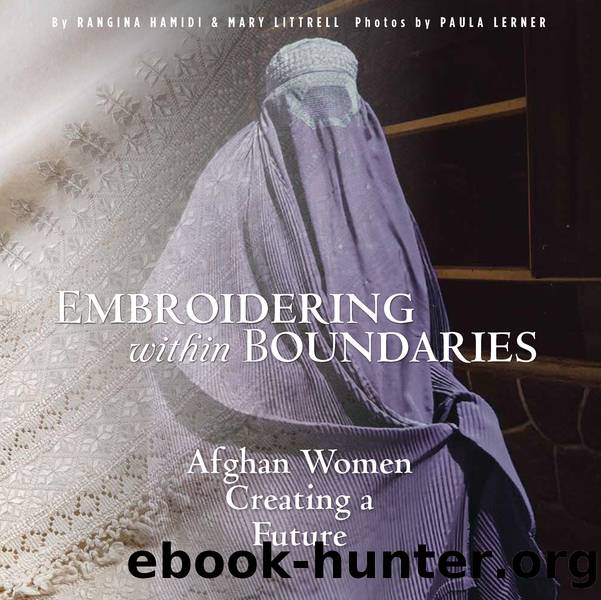Embroidering within Boundaries by Rangina Hamidi

Author:Rangina Hamidi
Language: eng
Format: epub
Publisher: Thrums Books
Published: 2017-03-15T00:00:00+00:00
TRAINING AS A BUSINESS ENTREPRENEUR
During the time Rangina led the Womenâs Income Generation Project for ACS, she mulled over alternative models for sustainable income generation. Nonprofit, donor agency, or government aid models seemed inadequate for what she hoped to accomplish. In reflecting on her ACS nonprofit experience, she said, âThe bureaucracies, the politics, the lack of a real vision forward disappointed me. In the past thirty years of war and destruction, my country had become a nation of beggars. We constantly were waiting to be spoon-fed by the world. I thought that the alternative was a business model. Business offered sustainability; business allowed people to stand on their own two feet; and business gave people hope to rebuild their lives with their own hands.â
Opportunities to participate in two entrepreneurship training programs in 2006 nourished Ranginaâs refocus toward a business model for development. Project Artemis at Thunderbird School of Global Management, located at Arizona State University, prepared Afghan women in entrepreneurship and business skills. Rangina described her three-week campus residency as a fast paced âmini-MBA where we were introduced to basic business principles. I saw potential to transfer what we were doing as a nonprofit project into a potentially viable business.â Topics such as finance, management, branding, advertising, and marketing seemed a good fit for Ranginaâs evolving business ideas.
A second program, BPeace (Business Council for Peace), applied a fashion perspective to Ranginaâs emerging business model. Following intensive fashion training at the Fashion Institute of Technology in New York, U.S. business volunteers traveled to Afghanistan for continued entrepreneurship mentoring.
Rangina recalled a pivotal exercise in the BPeace, âSilk Road Fashion Training.â Participants were asked to create a meaningful name for their businesses. As Rangina struggled, Toni Maloni, head of BPeace, challenged her to think of something valuable to highlight the intricate khamak handwork. Toni hinted at how customers shopping at Tiffanyâs in New York associated beautiful, high-quality jewelry with the company name. Rangina identified the word âtreasureâ to describe the valued khamak embroidery. She also wanted Kandahar as an Afghan identifier. Together they arrived at Kandahar Treasure. When translated to Pashto, it became Kandahari Khazana. Rangina said, âThis name would show to Afghan society that this embroidery was something valuable, as the name khazana was associated with a form of beloved historical poetry that is treasured by Afghans.â Beyond the curricular learning that Rangina gained from the two programs, she and other budding Afghan women entrepreneurs were mentored for more than ten years. Rangina still feels she can call on her mentors for ongoing support.
Download
This site does not store any files on its server. We only index and link to content provided by other sites. Please contact the content providers to delete copyright contents if any and email us, we'll remove relevant links or contents immediately.
Cecilia; Or, Memoirs of an Heiress — Volume 1 by Fanny Burney(32523)
Cecilia; Or, Memoirs of an Heiress — Volume 2 by Fanny Burney(31928)
Cecilia; Or, Memoirs of an Heiress — Volume 3 by Fanny Burney(31912)
The Great Music City by Andrea Baker(31894)
We're Going to Need More Wine by Gabrielle Union(19019)
All the Missing Girls by Megan Miranda(15881)
Pimp by Iceberg Slim(14461)
Bombshells: Glamour Girls of a Lifetime by Sullivan Steve(14036)
For the Love of Europe by Rick Steves(13792)
Talking to Strangers by Malcolm Gladwell(13327)
Norse Mythology by Gaiman Neil(13312)
Fifty Shades Freed by E L James(13214)
Mindhunter: Inside the FBI's Elite Serial Crime Unit by John E. Douglas & Mark Olshaker(9283)
Crazy Rich Asians by Kevin Kwan(9256)
The Lost Art of Listening by Michael P. Nichols(7475)
Enlightenment Now: The Case for Reason, Science, Humanism, and Progress by Steven Pinker(7287)
The Four Agreements by Don Miguel Ruiz(6726)
Bad Blood by John Carreyrou(6597)
Weapons of Math Destruction by Cathy O'Neil(6243)
